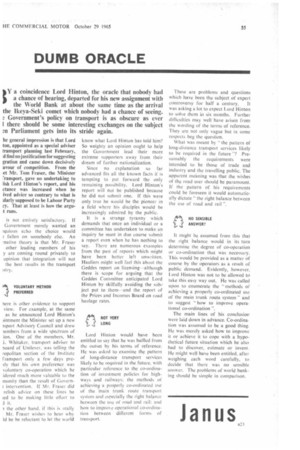DUMB ORACLE
Page 57

If you've noticed an error in this article please click here to report it so we can fix it.
IY a coincidence Lord Hinton, the oracle that nobody had a chance of hearing, departed for his new assignment with the World Bank at about the same time as the arrival the Ikeya-Seki comet which nobody had a chance of seeing. e Government's policy on transport is as obscure as ever I there should he some interesting exchanges on the subject en Parliament gets into its stride again.
he general impression is that Lord ton, appointed as a special adviser transport planning last February, d find no justification for suggesting gration and caine down decisively avour of competition. From the et Mr. Tom Fraser, the Minister "ransport, gave no undertaking to lish Lord Iiinton's report, and his dance was increased when he ived advice so contrary to what is Ilarly supposed to be Labour Party cy. That at least is how the argut runs.
is not entirely satisfactory. If Government merely wanted an :quious echo the choice would ! fallen on somebody else. An 'native theory is that Mr. Fraser other leading members of his y are coming round privately to opinion that integration will not the best results in the transport tstry.
1 VOLUNTARY METHOD . PREFERRED here is other evidence to support view. For example, at the same as he announced Lord Hinton's Antment the Minister set up a new isport Advisory Council and drew tembers from a wide spectrum of ion. One of the members. Mr. 3. Whitaker, transport adviser to 'ooard of Unilever, was telling the ropolitan section of the Institute fransport only a few days presly that his own preference was voluntary co-operation which he idered much more valuable to the munity than the result of Govern
intervention. If Mr. Fraser did relish advice on these lines he ied to be making little effort to :I it.
the other hand. if this is really Mr. Fraser wishes to hear why Id he be reluctant to let the world
know what Lord Hinton has told him? So weighty an opinion ought to help the Government lead their more extreme supporters away from their dream of further nationalization.
Since no explanation so far advanced fits all the known facts if is tempting to put forward the only remaining possibility. Lord Hinton's report will not be published because he did not submit one. If this were only true he would be the pioneer in a field where his disciples would be increasingly admired by the public.
It is a strange tyranny which demands that once an individual or a committee has undertaken to make an inquiry he must in due course submit a report even when he has nothing to say. There are numerous examples from the past of reports which might have been better left unwritten. Hauliers might well feel this about the Geddes report on licensing—although there is scope for arguing that the Geddes Committee anticipated Lord Hinton by skilfully avoiding the subd ject put to them--and the report of the Prices and Incomes Board on road haulage rates.
NOT VERY LONG
Lord Hinton would have been entitled to say that he was baffled from the outset by his terms of reference. He was asked to examine the pattern of long-distance transport services likely to be required in the future, with particular reference to the co-ordination of investment policies for highways and railways: the methods of achieving a properly co-ordinated use of the main trunk route transport system and especially the right balance between the use of road and rail: and how to impro‘e operational co-ordination between different forms of transport.
These are problems and questions which have been the subject of expert controversy for half a century. It was asking a lot to expect Lord Hinton to solve them in six months. Further difficulties may well have arisen from the wording of the terms of reference. They are not only vague but in some respects beg the question.
What was meant by "the pattern of long-distance transport services likely to be required in the future '"? Presumably the requirements were intended to be those of trade and industry and the travelling public. The apparent meaning was that the wishes of the road user should be paramount. If the pattern of his requirements could be foreseen it would automatically dictate the right balance between the use of road and rail ".
NO SENSIBLE ANSWER?
It might be assumed from this that the right balance would in its turn determine the degree of co-operation or co-ordination that was necessary. This would be provided as a matter cif course by the operators as a result of public demand. Evidently, however, Lord Hinton was not to be allowed to take this easy way out. He was called upon to enumerate the " methods of achieving a properly co-ordinated use of the main trunk route system " and to suggest " how to improve operational co-ordination ".
The main lines of his conclusion were laid down in advance. Co-ordination was assumed to be a good thing. He was merely asked how to improve it or achieve it to cope with a hypothetical futttre situation which he also had to discover, estimate or invent. He might well have been entitled, after weighing each word carefully, to decide that there was no sensible answer, The problems of world banking should be simple in comparison.
Janus




















































































































